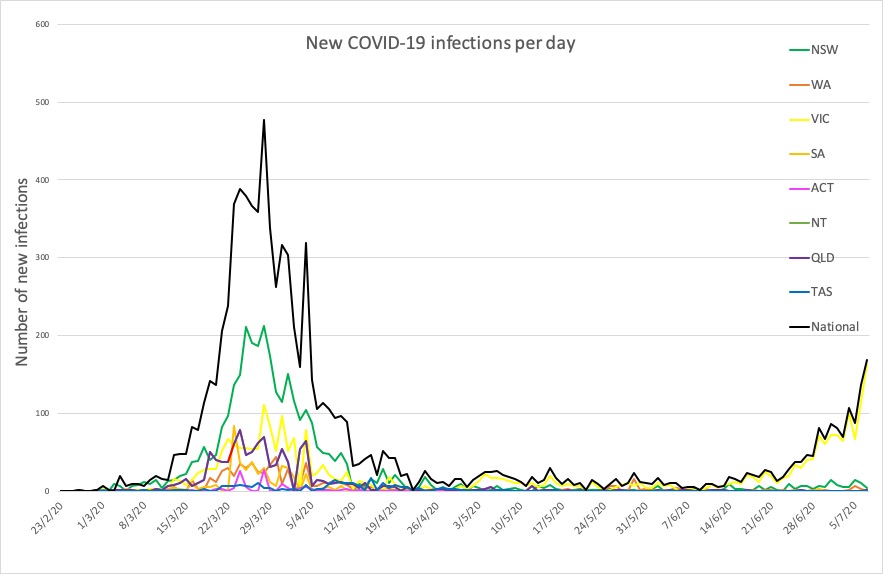Mask-wearing can help reduce the risk of COVID-19 transmission in situations where physical distancing is difficult, the AMA has advised.
Welcome to Wednesday’s The Medical Republic‘s COVID Catch-Up.
It’s the day’s COVID-19 news into one convenient post. Got any tips, comments or feedback? Email me at bianca@biancanogrady.com.
8 July
- Masks can help reduce risk of transmission in crowded places, AMA says.
- Global availability of HIV antiretrovirals threatened by COVID-19 pandemic.
- Lockdowns in China associated with significant reductions in air pollution.
- Victorian cases rise further, and ACT records three new cases linked to Victorian outbreak.
- Mask-wearing can help reduce the risk of COVID-19 transmission in situations where physical distancing is difficult, the AMA has advised.
As metropolitan Melbourne returns to tighter restrictions, AMA President Dr Tony Bartone says masks can help on public transport or in crowded locations such as shops, particularly in areas where transmission is high. However he stressed that masks are not a silver bullet, even when fitted and worn properly.
Masks must cover the nose and mouth, with the strap behind the ears, and be fitted tightly. They must also not be damaged, wet or old. - Global access to HIV medicines is being affected by COVID-19, with a survey by the World Health Organisation finding 73 countries are at risk of running out of antiretroviral medications. The survey found 24 countries – home to an estimated 8.3 million individuals with HIV – already have critically low stocks of these essential medications, or have experienced disruptions to supply chains.
Another recent modelling exercise suggested that a six-month disruption in access to antiretroviral medications in sub-Saharan Africa could see the number of AIDS-related deaths double in 2020 alone. - One ray of light in dark times: a study has found significant decreases in air pollution in China during COVID-19 lockdowns, and suggests those decreases are likely to be greater in wealthier, more industrialised, and colder cities.
According to a paper published in Nature Sustainability, researchers collected air quality data from 1600 monitoring stations across China, from January 1-March 1, 2020, and mapped this onto the timelines of local lockdowns across the nation. They saw a 17% declined in daily air quality index measurements and in the levels of small particulate air pollution, even after accounting for local weather conditions. They also noted reductions in other pollutants such as nitric oxide and carbon monoxide.
The effect of lockdown was more pronounced in colder areas because of reduced need for heating in offices and schools.
“Our result, that city lockdowns substantially improve air quality, is an essential component in assessing the benefits of such lockdowns,” they wrote. - The Victorian COVID-19 surge is rippling out across the country, with the ACT reporting three new cases today – the first new cases since early June – in the same family and linked to the Victorian outbreak. Victoria itself recorded 191 new cases on Tuesday, but 27 previous cases were reclassified due mainly to duplications, so the total number of new cases for that day is 164. Thirty five Victorians have been hospitalised, and nine are in intensive care. Seven of NSW’s eight new cases are in returned travellers in hotel quarantine.
Here are the confirmed COVID-19 infection figures around Australia, to 9pm Tuesday:
National – 8755, with 106 deaths and 7455 recovered
ACT – 108
NSW – 3433
NT – 30
QLD – 1068
SA – 443
TAS – 228
VIC – 2824
WA – 621



